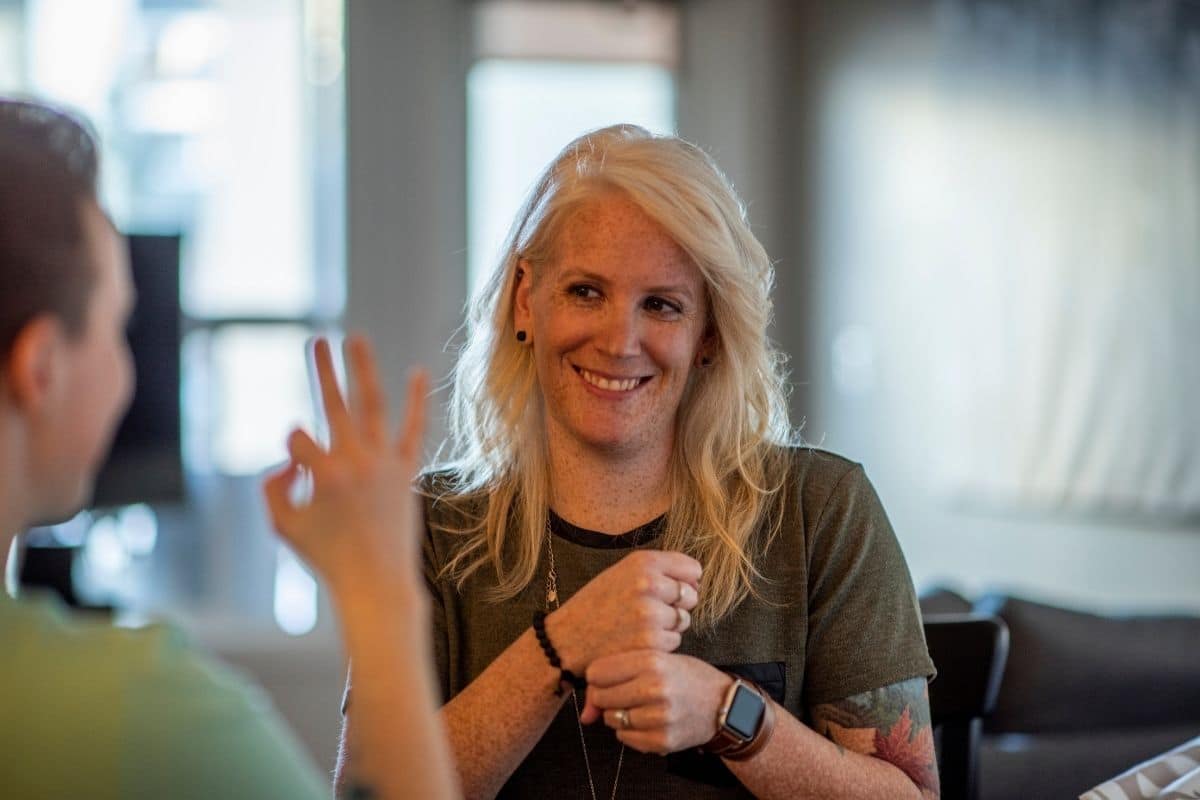
Workshops for the Deaf community
Feros Care has dedicated a series of workshops over the past month to helping Australians in the Deaf community unravel and understand the terminology used in their NDIS plans while also showing them how to access appropriate services and supports.
The four online workshops were designed to unpack the meanings of common NDIS language, answer questions about services and equipment, support people in self-management including how to use their NDIS budgets, and to provide information on the importance and benefits of using NDIS plans for early intervention for children with hearing loss.
One of the main motivators for the workshops was the identification of a high number of people in the Deaf community not implementing their plans and spending their funds.
In consultation with the NDIS ECEI (Early Childhood Early Intervention) partner in the ACT (Each), the same was the case for families not spending their plan funds. Each ECEI joined Feros Care to develop and deliver the workshops and provided information together for those aged 0-65.
They also provided information for families on the transition process from early childhood early intervention to entering the full scheme if needed.
The ACT Feros Care team had also recently found that a relatively low number of people in the Deaf community self-managed their own plans because they were unfamiliar with some of the language used by the NDIS.
Feros Care Community Development Coordinator (CDC) Tricia Hoad said the virtual workshops had been successful, and she was hoping that future information options might include informal sessions at local resource centres.
“We got a good response for the workshops in terms of being inclusive, and the next step is face-to-face drop-in access.”
Auslan and Live Captioning were provided throughout the workshops, and survey results have shown that 75% of respondents were helped to better understand NDIS language, 75% reported gaining a better grasp of NDIS funding methods and budgets, while 100% of people said the session was accessible to their needs.
Ms Hoad said Feros Care had received feedback from people who said that when they were given their NDIS plan for the first time, they hadn’t known how to implement it because they didn’t understand some of the language used in the cover letter, and this was why the first workshop focused on unpacking terminology.
“For some people it can be the context of the language that is different. Even being able to unpack the difference between NDIA and NDIS is helpful. Or explaining the difference between funded supports, informal supports and community and mainstream supports.”
The second workshop was directed at informing people about the services or supports that could help them achieve the goals in their plan.
Some examples of situations which were discussed included adults with cochlear implants who were seeking speech pathology sessions to make the best use of the new sounds they were hearing but were unsure if the NDIS funded this.
There were also parents who were both Auslan users and whose child has delayed speech,but were unsure if they could access speech pathology for their child.
Other conversations covered the privacy of NDIS plans, booking interpreters, and how to access help to purchase the best piece of equipment.
“We talked about low-cost and high-cost equipment and safety concerns around your home. For example, would you hear the smoke alarm, door bell or phone? Because you can get flashing lights that will alert you, so it’s about accessing SMART technology and Assisted Technology (AT).”
Budgets and self-management techniques had also been identified as crucial and were the focus of the third workshop.
Ms Hoad said three types of support budgets were explained along with how any funding is based on “what is reasonable and necessary”.
Since the workshop, 80% of participants surveyed have said they increased their understanding of how to apply “reasonable and necessary”.
Participants were also guided through the Participant MyPlace Portal via screenshots and were shown how they would need to link their NDIS account with their myGov account.
“We stepped them through all of that and showed them how they can see what they’ve spent funds on and how to create and view payment requests or claims,” Ms Hoad said.
“We wanted them to be able to build their confidence. And we wanted to visualise for people how they can self-manage their plan.”
The fourth workshop, for families with children under 7, stressed the importance of early intervention.
Ms Hoad said building an understanding of the importance of early intervention and developing knowledge, skills and confidence for families can have a huge impact on a child’s learning.
She said the NDIS Each ECEI has a transdisciplinary team of speech pathologists, early childhood educators and teachers, social workers and physiotherapists, and Each staff members are recognised as Early Childhood Early Intervention Specialists.
“With developmental delay, the ECEI Coordinator can connect families with support networks and community groups such as playgroups and help parents to monitor their child’s development goals and decide what types of support are best for their child.”
Feros Care and Each worked together at the workshops and were able to message participants and families to reach out to their Local Area Coordinator or ECEI Coordinator for one-on-one support or extra guidance with the Participant MyPlace Portal.
After the first virtual workshop, Feros Care devised a glossary of terminology to highlight the language people often don’t understand in their plans.
“It is now out for consultation with the Deaf community to see if it is a helpful resource,” Ms Hoad said.
“The aim is to distribute the glossary to services and organisations where it can be easily accessed along with the face-to-face drop-in sessions to connect with a Feros Care NDIS Local Area Coordinator.”